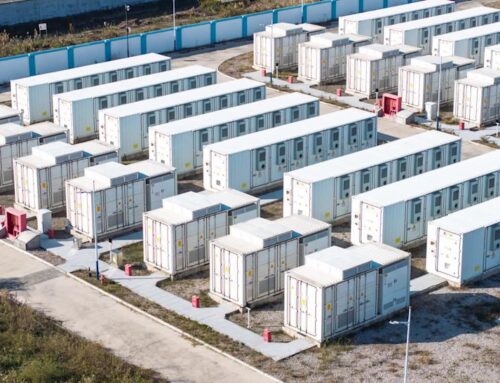To avoid climate catastrophe, we must take on Big Oil
September 28, 2025
It sounds like common sense: scale up renewable energy fast enough and fossil fuels will simply fade away. Technology, innovation and market forces will quietly do the job, sparing us the messy politics of taking on Big Oil.
Unfortunately, that is neither how the energy system works nor is it in line with the basic dynamics of supply and demand. Through years of climate conferences, national pledges and plunging costs for wind, solar and batteries, global fossil use has not fallen at all. In fact, it has continued to rise, causing us to accelerate into the climate problem.
Since the first UN climate summit in 1995, global renewable and other non-fossil energy supply has more than doubled, rising by 161 per cent. That sounds like good news – until you see that over that same period, the global supply of fossil energy has increased by 57 per cent. Energy from fossil fuels has carried on climbing at 1.8 per cent per year, roughly the same as it has since 1850.
Some argue that the recent slowdown in fossil emissions growth shows renewables are finally winning. The past decade has indeed seen fossil fuel emissions rise more slowly than the long-term 1.8 per cent trend, and solar and wind may have helped. But history shows such dips are often temporary. Every slowdown in emissions growth since 1850 has been followed by a period that rockets off in the other direction. From AI to space tourism, today we’ve an unlimited appetite for all the energy we can get our hands on, and now with “drill baby drill,” it is all too easy to imagine rising growth rates of both fossil fuel and renewables.
Most of the potential of renewables to replace fossil fuels will always be lost to this ballooning demand. The fossil fuel lobby knows this is fantasy – and it spreads three myths to keep things the way they are. The first is the myth of “perfect substitution” – the idea that green energy can actually replace coal and so forth like-for-like, without any dip in energy output. It’s wishful thinking that encourages governments to keep handing out huge subsidies to them, such as the billions of pounds in public money now being poured into new gas-fired power stations with carbon capture technology, while they can claim the clean energy boom will soon make fossil fuels obsolete.
A second myth is that constraining global energy use will diminish quality of life, especially for poorer nations and poorer households. The opposite is in fact true. What lowers living standards is the colossal waste built into today’s slipshod energy use: poorly insulated homes, gas-gulping SUVs on urban roads, private jets and a whole culture of over-consumption that doesn’t boost human wellbeing. Meanwhile, millions of families can’t afford the basics. Cutting waste and the energy-guzzling by society’s richest creates space for poorer nations and households to use more energy where it’s genuinely needed. In the UK, government support for home insulation, clean transport and efficient technologies could shrink total demand and improve our quality of life.

If renewables are to replace fossil fuels, there’s no avoiding the hard part: we must constrain the latter’s extraction and use. That means saying no to new drilling, ending subsidies, and putting real limits on supply. Yes, total energy output may be tighter for a period while clean power scales up. But this is the only way substitution becomes a concrete reality rather than so much hot air.
I’m open to offers on how best to constrain fossil fuels, but carbon pricing – that is to say, a fee on emissions and offering an incentive for emitting less – seems to me the simplest mechanism to get there. Most economists agree. This is exactly why the fossil fuel lobby blocks it at every climate conference. And so to their third myth: that carbon pricing would increase the cost of living. This relies on a spectacular lack of imagination as to how the price is implemented and what we do with the money raised, which could be spent on many benefits to wider society, ensuring that only the most energy-hungry in our society lose out financially. And in a carbon-constrained world, any business offering an energy efficiency improvement in any sector will experience a wonderful surge in demand. These are the employers of tomorrow.
The deeper obstacle is that whilst politicians have the levers to rein in fossil fuel use, through taxation, regulation and subsidy reform, pulling those levers requires them to take on the daunting task of confronting the immense power of Big Oil, whose deep-pocketed lobbying and disinformation have so far outweighed public demand for action.
Tackling this imbalance is not optional; it’s the key to averting catastrophe. But leaders won’t act decisively until the scale of the threat is impossible to ignore. That’s why shifting public and political understanding is so urgent.
On 27 November, I will chair the UK’s first National Emergency Briefing at Westminster Central Hall, putting MPs and decision-makers face to face with unvarnished evidence presented by expert researchers across energy, food, health, security and the economy. We can rise to this challenge, but only if we first face it honestly – politicians and the public alike.
That is why the event will be filmed and screened nationwide, so the country can see what its representatives see.
Renewables alone won’t get us there. But an informed, mobilised democracy just might.
Mike Berners-Lee is the author of ‘A Climate of Truth’, a professor at Lancaster University, and the founder of Small World Consulting
Search
RECENT PRESS RELEASES
Related Post



